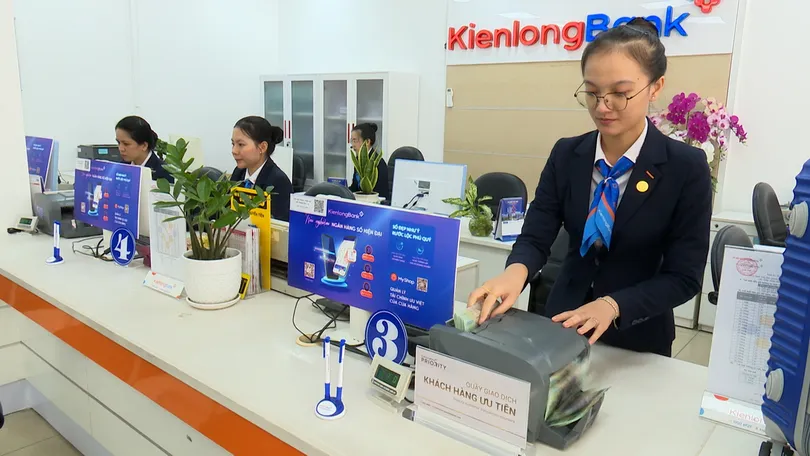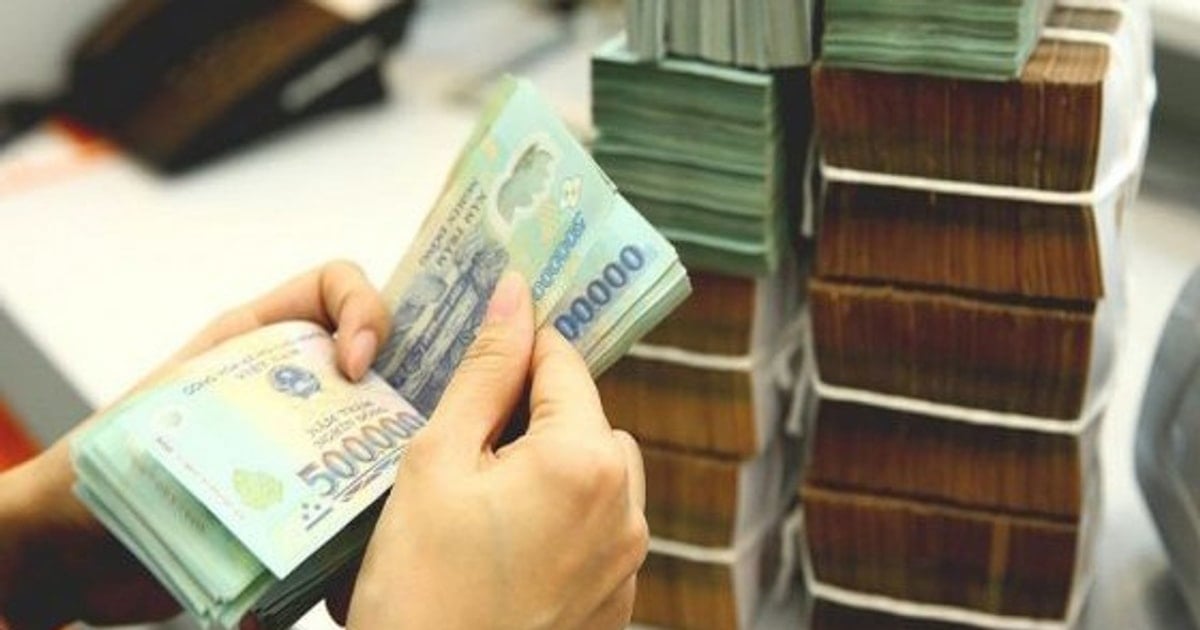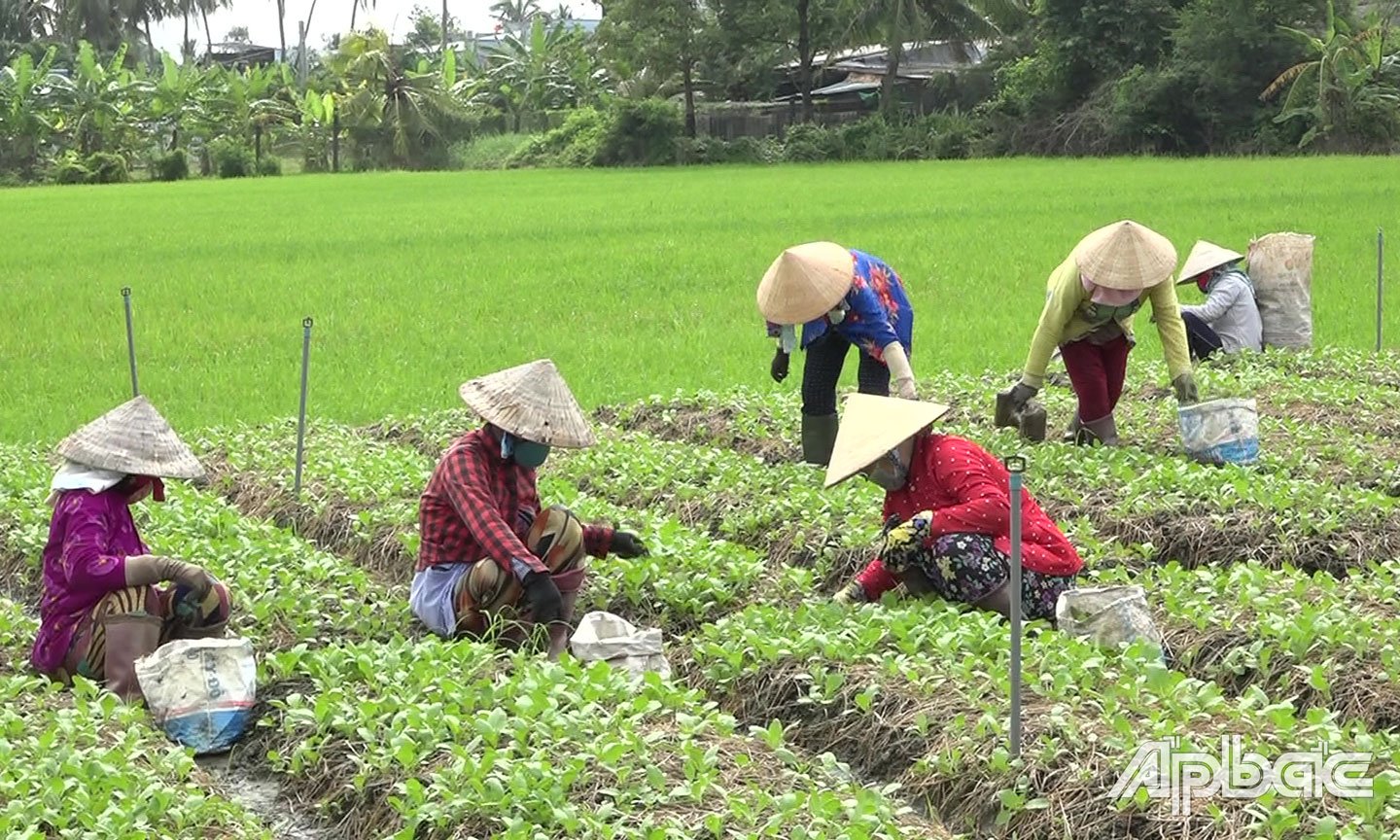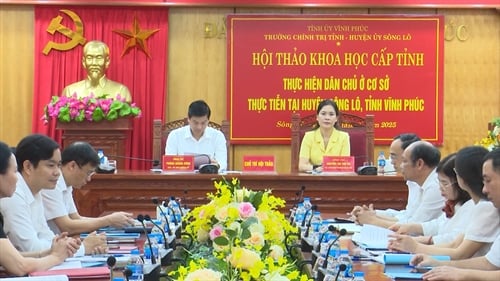
Reducing value added tax helps stimulate consumption. In the photo: Consumers shop at Winmart+ supermarket.
Expanding the tax reduction target
The Ministry of Finance has just sent an official dispatch to ministries, branches and localities, asking for opinions on the National Assembly's draft Resolution on reducing value added tax.
Accordingly, the Ministry of Finance proposed to reduce 2% of value added tax from July 1, 2025 to December 31, 2026 for groups of goods and services currently subject to a tax rate of 10% (to 8%), except for some groups of goods and services such as telecommunications, financial activities, banking, securities, insurance, real estate business, metal products, mining products (except coal), goods and services subject to special consumption tax (except gasoline).
Notably, the Ministry of Finance proposed to expand the subjects eligible for a 2% VAT rate reduction, including: Information technology products and services (washing machines, microwave ovens, data processing services, rentals and related activities, information portals, etc.), prefabricated metal products such as barrels, tanks and metal containers, boilers; coke, refined petroleum (coke, fuel oil and gasoline, lubricating grease, etc.), chemical products (fertilizers and nitrogen compounds, plastics and synthetic rubber in primary form, etc.), coal at the import stage and coal sold at the commercial stage; gasoline and oil.
According to the Ministry of Finance, these are goods and raw materials used for direct production and consumption. In particular, although gasoline and oil are subject to special consumption tax and are on the list of mining products, they are important items for many production and business sectors as well as people's lives. Increases or decreases in gasoline and oil prices will directly impact domestic production and consumption and macroeconomic stability.
If this policy is approved, the expected reduction in state budget revenue in the last 6 months of 2025 and the whole year of 2026 is equivalent to about 121.74 trillion VND; of which the last 6 months of 2025 will decrease by about 39.54 trillion VND, and in 2026, it will decrease by about 82.2 trillion VND.
From 2022 to the first half of 2025, the 2% reduction in value-added tax rates for groups of goods and services currently subject to a 10% tax rate has had a positive impact on businesses and consumers. In the first two months of 2025 alone, the amount of value-added tax reduced according to Resolution No. 174/2024/QH15 of the National Assembly is estimated at VND 8.3 trillion, thanks to which the total retail sales of goods and consumer service revenue increased by 9.4% over the same period last year.
This proposed tax reduction not only continues to support businesses but also aims to increase Gross Domestic Product (GDP) growth by 8% or more by 2025, creating a foundation to achieve double-digit growth in the 2026-2030 period.
Practical policy

Reducing value added tax has the effect of stimulating production and promoting business, thereby contributing to creating more revenue for the budget. Photo: Nhat Nam
Evaluating this proposal of the Ministry of Finance, experts said that this is a practical solution, contributing to stimulating consumer demand, promoting production and business, and economic growth.
Dr. Nguyen Van Hien, Vice President of Gia Dinh University, acknowledged that reducing value added tax is a very practical policy. This policy helps reduce the price level of goods in the market, thereby supporting demand stimulation, contributing to controlling inflation and developing the economy. By reducing the price level of goods, reducing value added tax has supported the market and indirectly supported businesses to consume more goods, thereby creating conditions to restore production and expand the market.
Unlike the previous VAT reduction policy, which only applied for 6 months each time, this time, the Ministry of Finance proposed an application period of 1.5 years and expanded to a number of commodity groups, including gasoline and oil. Gasoline and oil are inputs for many industries and professions. When the input decreases, businesses producing goods and providing services to the market will have room to ensure stability, even reduce selling prices. "Therefore, when the policy is approved, it will effectively support people and businesses, while controlling inflation, ensuring macroeconomic stability, and promoting economic growth," said expert Nguyen Van Hien.
Sharing the same view, Associate Professor Dr. Le Xuan Truong, Head of the Tax - Customs Department (Academy of Finance) said that total consumer demand accounts for the largest proportion, 60-70% in the GDP structure. Therefore, stimulus policies to boost people's spending will be the fastest and most effective solution to promote growth and remove difficulties in output for businesses.
Regarding the large reduction in budget revenue, Dr. Nguyen Van Hien acknowledged that it is still possible to ensure a balanced state budget because the Ministry of Finance has calculated to increase a number of other revenue sources, such as revenue from transfers, real estate business, e-commerce business (especially cross-border e-commerce), revenue from individual gold trading, etc. In addition, tax authorities are promoting the application of information technology in management to reduce budget losses. Along with measures to increase revenue, it is necessary to thoroughly save and reduce budget expenditures, resolutely cut unnecessary or ineffective expenditures.
Dr. Nguyen Minh Phong said that reducing value added tax has the effect of reducing budget revenue but also has the effect of stimulating production and promoting business, thereby contributing to creating more revenue for the budget.
Executive Director of the Faculty of Finance and Banking (Nguyen Trai University) Nguyen Quang Huy:

Need strategic and fundamental solutions in the long term
The policy of reducing value-added tax during this period is necessary to stimulate consumption, promote production and business and create room for growth. However, instead of applying a uniform tax reduction, the policy should be designed more flexibly, focusing on areas that have a large spillover effect on the economy and people's purchasing power. Industries that play a role in stimulating demand and creating many jobs can enjoy deeper tax reductions, while areas that have less impact on overall aggregate demand need to be considered to ensure the sustainability of the state budget. In addition, it is necessary to focus on improving the quality of products and services, not only supporting businesses but also increasing the competitiveness of Vietnamese goods in the international market.
For the economy to develop sustainably, it is necessary to combine long-term strategies and foundations such as selectively attracting FDI, increasing added value in production, expanding markets and increasing consumer confidence.
Chairman of Hanoi Transport Association Do Van Bang:

Very useful policy for business
In this proposal, although gasoline and oil are subject to special consumption tax, this is a group of goods that has a great impact on many production sectors and people's lives, so we are very pleased that the Ministry of Finance has added gasoline and oil and some other groups of goods to the list of goods subject to value-added tax reduction from July 2025 to the end of 2026.
Gasoline and oil are currently subject to a 10% value added tax, when the policy is enacted it will be reduced to 8%. Accordingly, the selling price of gasoline will decrease by 2%, meaning that for every 1 million VND of gasoline and oil purchased, consumers will save 20,000 VND. For the transportation industry, the cost of gasoline and oil is very high, accounting for 30% to 40% of the total cost of the enterprise. In the current difficult business context, the above savings are very significant. Therefore, this is a very useful and practical policy. Reducing the value added tax by 2%, especially on gasoline and oil, will have a direct impact on reducing transportation fares, effectively stimulating demand for the transportation industry.
Ms. Pham Thi Hoa, Dich Vong Hau ward, Cau Giay district:

People save significantly on costs
When VAT is reduced, people are the direct beneficiaries when the prices of goods and services decrease. Calculating the total monthly spending, especially for families with small children, the savings are quite significant. The authorities' proposal to reduce VAT until the end of 2026 is good news for consumers.
The good news is that this proposal also includes gasoline, oil and some other high-value product groups, such as washing machines, microwave ovens, etc. The reduction in gasoline and oil prices thanks to the reduction in value-added tax will have an impact on the prices of other consumer goods and services, so consumers will continue to benefit more.
The policy of reducing value added tax is practical and helpful for people when buying goods. Hopefully, the policy will be issued soon to support consumption and stimulate the domestic market, promoting production and business enterprises. In the current context, all support policies are valuable because they help reduce people's burden.
Source: https://baotuyenquang.com.vn/kich-cau-tieu-dung-ho-tro-doanh-nghiep-phat-trien-209240.html






![[Photo] Overcoming all difficulties, speeding up construction progress of Hoa Binh Hydropower Plant Expansion Project](https://vstatic.vietnam.vn/vietnam/resource/IMAGE/2025/4/12/bff04b551e98484c84d74c8faa3526e0)
![[Photo] Closing of the 11th Conference of the 13th Central Committee of the Communist Party of Vietnam](https://vstatic.vietnam.vn/vietnam/resource/IMAGE/2025/4/12/114b57fe6e9b4814a5ddfacf6dfe5b7f)














































































Comment (0)